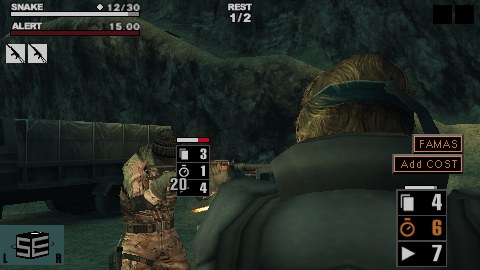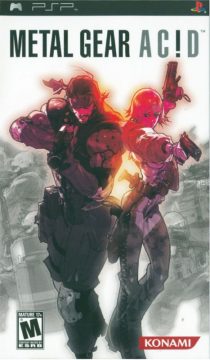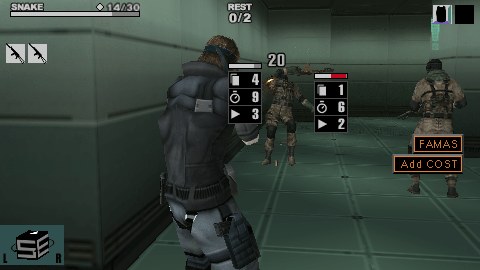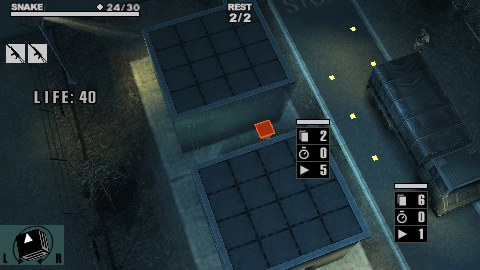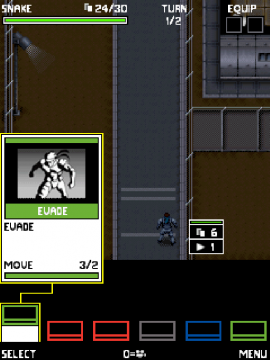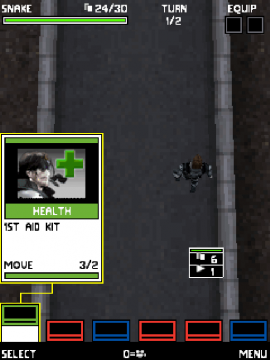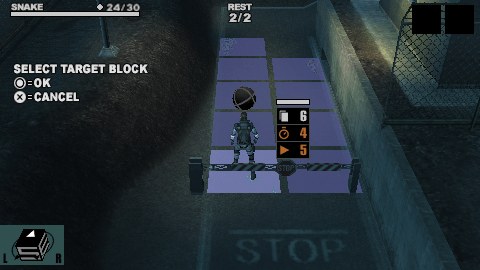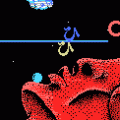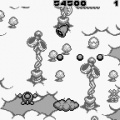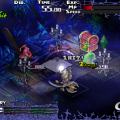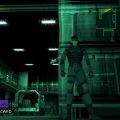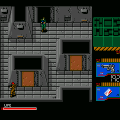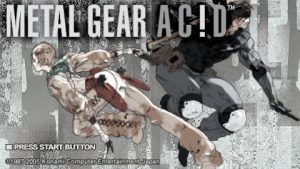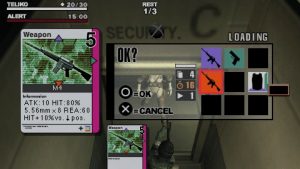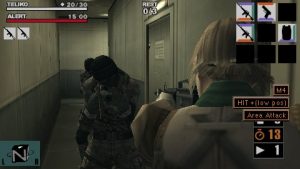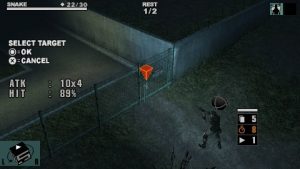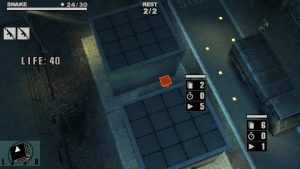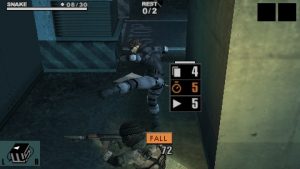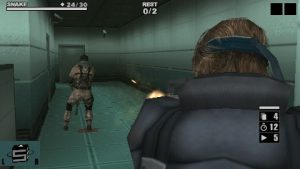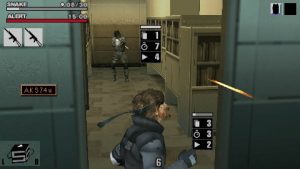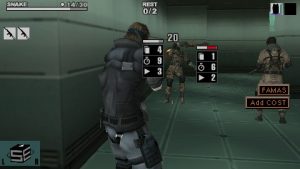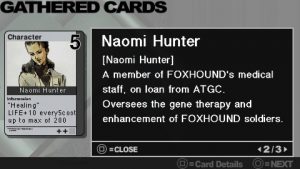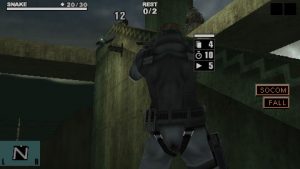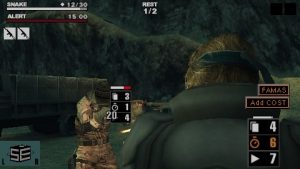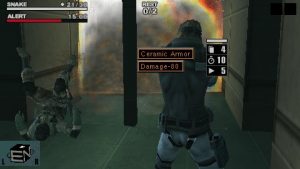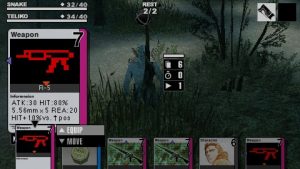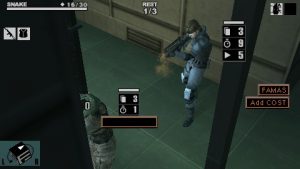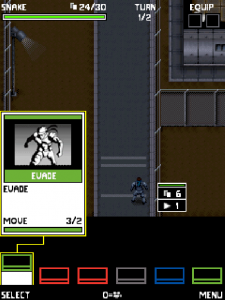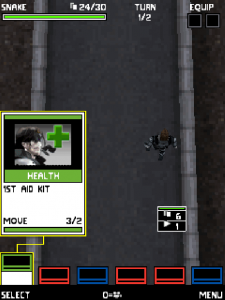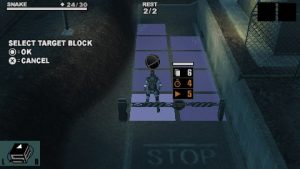- Metal Gear
- Snake’s Revenge
- Metal Gear 2: Solid Snake
- Metal Gear Solid
- Metal Gear Solid Integral Staff Commentary
- Metal Gear Solid (Game Boy Color)
- Metal Gear Solid 2: Sons of Liberty
- Document of Metal Gear Solid 2, The
- Metal Gear Solid: The Twin Snakes
- Metal Gear Solid 3: Snake Eater
- Metal Gear Solid 4: Guns of the Patriots
- Metal Gear Solid: Portable Ops
- Metal Gear Solid: Peace Walker
- Metal Gear Solid V: Ground Zeroes
- Metal Gear Solid V: The Phantom Pain
- Metal Gear Rising: Revengeance
- Metal Gear Touch
- Metal Gear Acid
- Metal Gear Acid 2
- Metal Gear Solid Mobile
Never let it be said that Metal Gear avoided taking chances. Sony, at the end of 2004 and the start of 2005, made their entry into the handheld space with the PlayStation Portable. The system provided some impressive specs at the time, with developers like Capcom, Namco, and Electronic Arts signing on in the launch window. Naturally, Konami didn’t want to be left out in the cold, so Solid Snake was there at launch with Metal Gear Acid (stylized with all caps & an exclamation mark for ‘i’ on the box art). Only, rather than adapt the memorable gameplay from the PS1 & PS2 games, this first taste of Metal Gear on the PSP is a turn-based strategy game with deck building elements. The game certainly makes some interesting swings with this odd combo, but does it pay off?
The story is another spin off, like Ghost Babel for the Game Boy Color before it, only much vaguer as to where it spins off. Snake has retired to Alaska and is once more called back for another mission. Only this time, instead of Roy Campbell, it’s a good friend of his, Roger McCoy from the CIA. Terrorists have hijacked a US senator and potential future president mid-flight. They demand that the government turn over information and materials related to Pythagoras, a mysterious research project being conducted in the fictitious Moloni Republic in Africa. Along the way, he joins up with a hostage negotiator from the FBI, Teliko Friedman. The hijackers are a couple of comic book villains, including a pair of puppets with some unique facial expressions. Snake heads to the laboratory where the secret Pythagoras project is, charged with discovering its importance and rescuing the kidnapped senator. Unlike the rest of the series, voice acting is a no show, hurting the overall presentation.
That’s right; there’s a Card Shop. And deck building. In a Metal Gear game. It is a strange sight, booting up the game and the first action that the player is asked to do is to choose a card and move Snake four spaces to the north. The designers took great pains to explain the game’s systems, and even for a Metal Gear game, Acid tutorializes a lot. The turn-based strategy, a genre famous for slow thoughtful gameplay, that the player navigates works in concert with a decently complex deck building system. The player’s hand (up to 6 cards) provides the weapons, moves, and accessories that Snake uses during the mission. Some cards can be equipped, providing temporary or one-use stat bonuses like increased evasion and better accuracy. Many of Snake’s moves – hanging, crawling, flattening against a wall – are all show up, adding some unique differences from other turn-based strategy games. Teliko, who joins the party about a third of the way through the game, plays different from Snake, able to do more during her turn while having less HP, and the two characters can pull off some helpful combo moves on the battlefield.
The strategy is functional, if a bit simple, in Acid; where the complexities come in is the card system. While it starts out simple and its tutorials focused on the basics of movement & attack, more wrinkles are introduced later on. Players have to manage the COST system. Using bigger moves will drive up the COST for Snake, with each card denoting the amount in the upper right, and the higher the amount of COST Snake has, the farther down on the turn order list he goes. The game starts out by dolling out one-use weapons, in the form of the SOCOM & FAMAS, but later on, stronger weapons have to be equipped and loaded. So that means keep track of ammo when building your deck, and that’s on top of hoping that RNG for the cards works in your favor. Enemy behavior is at least decently consistent, and even when Snake’s spotted, there’s enough time to maneuver to safety or neutralize the threat with the right weapons. The camera is an annoyance, getting easily caught in geometry as players try to map out their best plan of attack. A multiplayer mode inspired by the Link Cable mode from Ghost Babel is included, pitting players head-to-head in a turn-based race to find top secret disks and exit the level first. It’s a fun little diversion for those with PSP-having friends.
Acid, being a launch title for a portable system, naturally doesn’t look as technically accomplished as Metal Gear Solid 2 while also being a step up from the PS1 game. Textures are simple and clean, resembling the kind of work that was done in Sons of Liberty, while the character models hew close to those found in the PS2 games thanks to the PSP’s hardware. Character design was handled by Tsubasa Masao, putting his own spin on the MGS aesthetic. The story portraits take after the design ethos from previous games, while the some of the playing cards feature the iconic character art from Yoji Shinkawa. While there’s a lack of voice acting, there isn’t a lack of music. Akihiro Honda, Nobuko Toda and Shuichi Kobori, three familiar composers to the series, whipped up a layered and flexible sonic backing for this spin off outing.
A Java Mobile version of Metal Gear Acid showed up in 2008, in European territories only from prolific mobile developer Glu Mobile. It’s the same game with the same scenario with some edits, and a tutorial that takes place on the series’ VR mission stages. The port came in two variants, one done up in a sprite style reminiscent of the the MSX games, and another made of polygons, looking on par with the PS1 game. In either form, this port plays well enough, and the simplified interface avoids some of the annoying parts, like the camera.
Metal Gear Acid is a curiosity that largely works. It’s not perfect. The deck building aspect adds an extra layer of randomness on the dice-roll reliant genre of turn based tactics, but the combination still provides some fun strategic moments. Konami themselves saw fit to do a second title in this spin-off series, continuing the story and adding in new, somewhat esoteric features. Taking risks in game design, when it takes so much money and time to craft a video game, is well, risky, so it’s heartening to find even a quirky series like Metal Gear can even go out on a limb sometimes.
